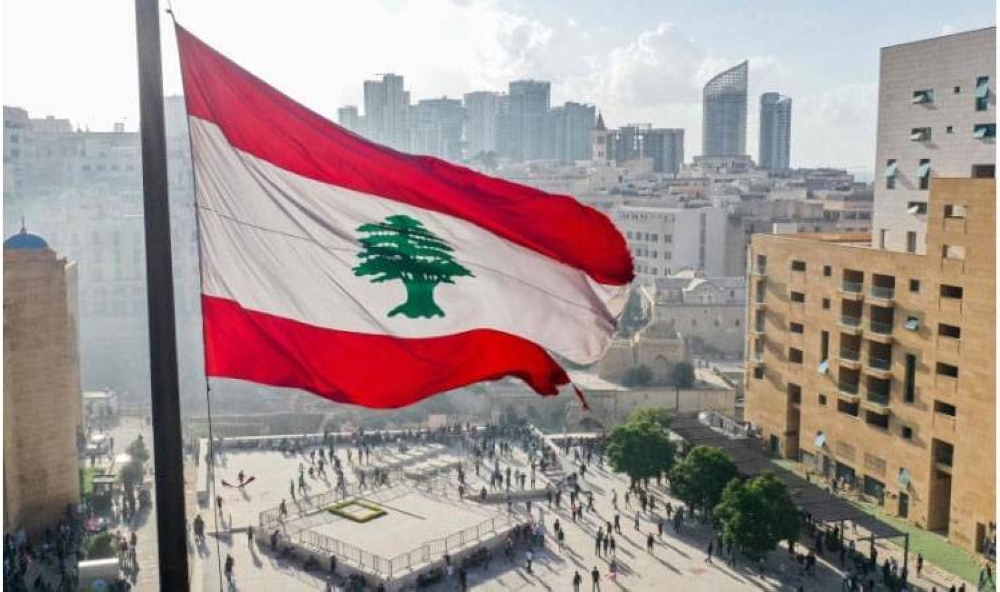Lebanon is grappling with severe economic and living conditions due to ongoing Israeli attacks since October, which have recently escalated, pushing the country deeper into its worst economic crisis since 2019.
The negative repercussions on the Lebanese economy are increasing due to the large wave of displacement of hundreds of thousands of Lebanese citizens from border areas and villages targeted by Israeli entity's airstrikes, which have led to the death and injury of thousands of residents. This wave of displacement has disrupted the economy in many Lebanese regions and governorates, with expectations of a rise in the number of displaced people in the near future.
An economic expert and member of the Economic and Social Council in Lebanon, Dr. Anis Abu Diab told the Qatar News Agency (QNA) that the Lebanese economy has been in an unprecedented crisis since 2019. The country has faced a series of calamities, such as mass protests, the COVID-19 pandemic, Beirut port explosion and the deposit crisis, which caused an estimated loss of around USD 80 billion, largely burdening depositors.
Dr. Abu Diab added that just as Lebanon began to regain some economic stability in 2022, particularly in the private sector, with positive forecasts for the summer of 2023 promising a rebound in the tourism sector, the escalation of violence in Gaza on Oct. 7, followed by the attacks on Lebanon the next day, dealt a harsh blow to the Lebanese economy. The tourism sector, a crucial pillar of the country's economy, has seen a sharp decline since then, he said.
Currently, Lebanon finds itself in a state of war, partially crippling its economy, he said, pointing out that the southern provinces are economically paralyzed, with expectations of up to one million displaced people moving from the south, Bekaa, and Dahiya to various Lebanese regions.
The member of the Economic and Social Council in Lebanon pointed out that the Israeli attacks' repercussions on the Ministry of Health and the Relief and Humanitarian Aid Organization are estimated at millions of dollars. He added that Lebanon was expected to achieve a growth rate of around 1.2 percent of GDP in 2024, but this figure has now dropped to 0.2 percent.
Dr. Anis Abu Diab told QNA that the direct financial losses due to the Israeli aggression on Lebanon are escalating, noting that Lebanon's budget for the upcoming year is estimated at USD 4.7 billion, which falls far short of covering the war's costs and reconstruction efforts. According to estimates from the International Monetary Fund (IMF) and Arab funds, the war's total cost could reach up to USD 10 billion.
He also pointed to the repercussions of the attacks on the tourism and industrial sectors, in addition to the devastation of thousands of hectares of agricultural land in southern Lebanon. These economic losses surpass the "capacity of Lebanon's fragile economy" amidst its ongoing crises, making it impossible to precisely estimate the total costs of the war and how Lebanon could finance its reconstruction efforts once the hostilities end.
Lebanon is suffering from a severe economic and living crisis, which the World Bank has classified as one of the ten worst crises, and possibly among the three most severe globally since the 19th century. A recent report by the United Nations Economic and Social Commission for Western Asia (ESCWA) revealed that poverty rates in Lebanon have soared to over 82 percent of the population.
The ongoing Israeli attacks come amid an already deteriorating economic situation that has persisted for years, with the majority of families now limiting their spending to basic necessities.
Observers believe that the Beirut Port explosion on Aug. 4, 2020, exacerbated the economic crisis and deepened the fears of Lebanese citizens about their country's ability to recover. The explosion killed around 200 people and injured 6,500 others, with damages estimated at approximately USD 15 billion. It also displaced 300,000 people and damaged more than 50,000 homes.
Lebanon, which imports most of its needs from abroad in US dollars, is currently facing a severe shortage of the US currency. This has fueled fears among citizens of a critical shortage in certain types of medications and high prices, a situation worsened by the continuous Israeli attacks that have extended to the southern governorates, Nabatieh, Bekaa, Baalbek, the southern suburbs of Beirut, and Mount Lebanon. The dollar shortage in banks, coupled with withdrawal limits imposed on both the dollar and the Lebanese pound, has led to panic and financial distress among most social classes.
Adding to the burden on the Lebanese economy is the growing number of Syrian refugees, which now exceeds two million. The Lebanese government and international donors are struggling to meet the needs of the refugees, with official estimates indicating that the cost of the Syrian refugee crisis on Lebanon has reached approximately USD 40 billion. This amount includes expenses for infrastructure, medical treatment, and subsidized food and essential supplies.
The ongoing Israeli aggression coincides with Lebanon's precarious economic situation, where the country's public debt exceeds USD 100 billion, and its growth rate stands at zero amid the high exchange rate of the US dollar against the collapsing local currency.
Lebanon has been subjected to attacks that have expanded throughout September, affecting the governorates of South Lebanon, Nabatieh, Bekaa, Baalbek-Hermel, Mount Lebanon, and the southern suburbs of Beirut. Thousands of casualties, both dead and injured, have been reported, including a large number of civilians. Israeli entity's airstrikes have targeted homes and residential buildings, causing them to collapse on their inhabitants, and have even targeted rescue and civil defense teams. This has forced tens of thousands of families in the affected areas to flee, with official statistics indicating that the number of displaced people could reach up to one million. This means that one million Lebanese citizens have been displaced within days in the largest displacement Lebanon has ever witnessed.

